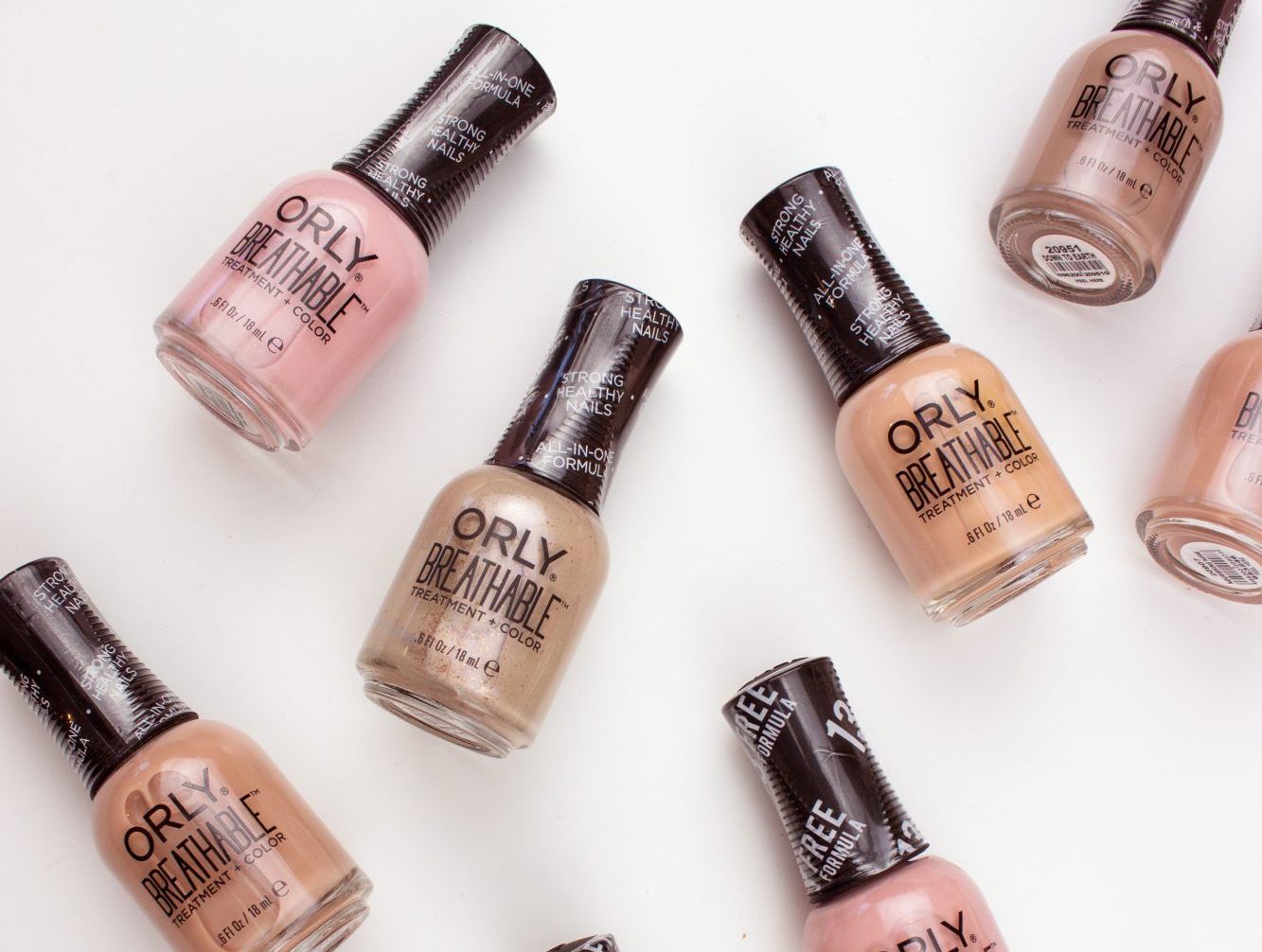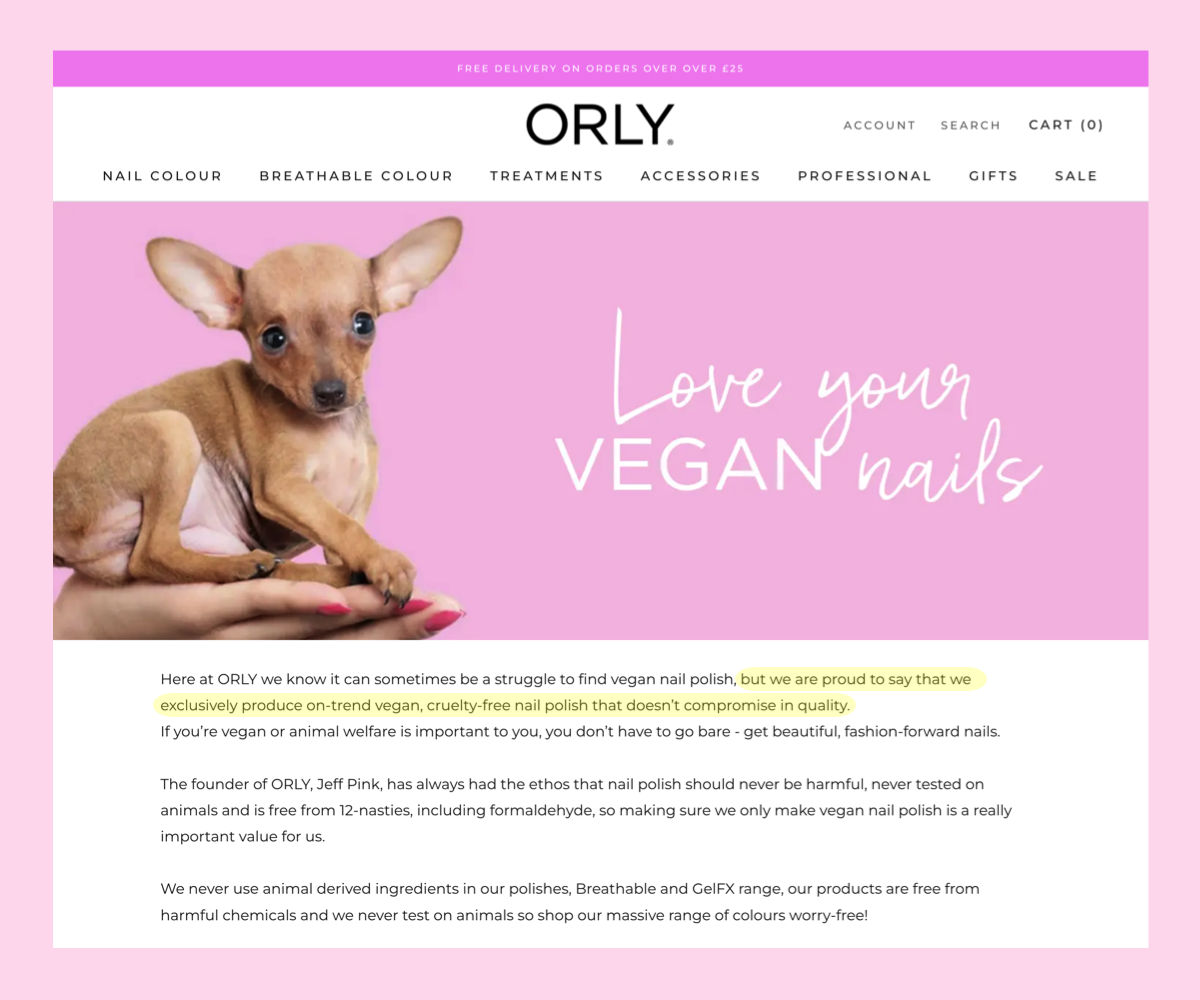Orly has been at the front of specialized nail looks and colors for decades. They advocate effective formulas, easy application, and healthy nails. But at what cost? Here are its cruelty-free and vegan policies you need to know.
Orly is cruelty-free. It doesn’t conduct animal testing on its products, nor does it distribute its cosmetics where animal testing is required by law. Orly is also 100% vegan – it doesn’t use any animal-derived ingredients.
Orly is a family-run business that was launched in 1975 by Jeffery Pink. For a large part of his career, he worked as a makeup artist on film sets in California.
After being inspired by the beauty industry – Pink saw a gap in the market. He wanted to create the first natural nail care when nail polish colors acrylic were your only options.
Pink became the man who developed the natural nail look that helped screen actresses save time between wardrobe changes. In time, he gave this elegant style its own name – the French manicure!
Before deciding on what to buy, here’s what you need to know about Orly's current animal testing policies, vegan ranges, formulation, and sustainability.
Is Orly Cruelty-Free and Vegan?
Orly is 100% Cruelty-Free
It does not:
Orly has a solid cruelty-free message, with accreditation from Leaping Bunny – the only internationally recognized certification that guarantees a brand is cruelty-free.
The brand is also independently owned and family-run, with no known association with animal testing.
This brings us to our next point:
Orly is Vegan
Orly is a well-priced and accessible nailcare brand that is entirely vegan. It does not use any animal-derived ingredients in any of its products.
Don’t these words make your heart skip a beat?
Remember that Orly is the exception and not the rule before you rush out to the shops to buy any nail polish brand.
Most mainstream nailcare brands are not 100% vegan. These are certain animal-derived ingredients to look out for in general:If you're interested in finding the best vegan products or vegan brand alternatives – keep reading or click on this link: Orly vegan products.
Animal Testing Policy and History
Orly has been certified by Leaping Bunny since 2008. This means Orly is committed to Leaping Bunny’s gold standard of cruelty-free policies and is monitored by the program.
It’s hard to find more information on the brand’s testing policies before this time, but we’re glad they’ve stuck out the commitment made for over 14 years.
Cruelty-Free Status in 2022
Here is a screenshot of Orly’s official statement regarding its cruelty-free policies and vegan products, taken from their website:
Certification
Orly is Leaping Bunny certified.
While you might know PETA very well – it surprisingly doesn’t hold the strictest cruelty-free regulations. It seems to only require a brand’s written consent that abides by the PETA code of conduct.
Certification from Leaping Bunny is ideal because it holds rigorous standards and does regular audits to ensure they are upheld.
Leaping Bunny certification proves that:
If you see a bunny stamp on the back of your product bottle –that’s an excellent sign. But don’t be fooled by the image itself. A lot of brands are using fake logos to mislead consumers.
Do your homework and see which products are genuinely cruelty-free first. This article will help you: Which Cruelty-Free Logos Can You Trust?
Is Orly Sold Where Animal Testing is Required By Law?
Orly does not distribute any of its products to China or any country that requires animal testing on any cosmetics by law.
China has a shocking track record. It is the country with the most animal testing globally, with over 20 million animals used per year.
However, if you live in China or are concerned about its cruel beauty policies, there are a couple of loopholes.
Here’s how to find cruelty-free cosmetics in China: Are Cosmetics Made in China Cruelty-Free?
The Best Vegan Orly Products
Orly has a beautiful and extensive range of vegan nail colors that continues to expand with every season.
There’s something for everyone, from classic tastes who want flesh tones to match their nail and skin tones to trendsetters' bright and brave colors.
To save you some time, here are some of Orly’s bestselling breathable nail colors:
For a complete list of Orly’s vegan products, you can find everything on their website.
Vegan Alternatives to Orly
With their breathable formulas and mesmeric colors, Orly has some great vegan nail products that other brands haven’t made yet.
The brand does have strong cruelty-free and vegan principles that act strongly in its favor.
But if the brand is not easily accessible to you, here are some alternatives we recommend:
Is Orly Natural and Organic?
No genuinely natural or organic nail color actually exists. Orly does not claim to be either, but they do claim to be free of the “12 harmful chemicals” often found in nail products.
We’ll delve into that below.
Clean vs. Natural Ingredients
The term “natural” is not regulated for cosmetics and skincare. In other words, it doesn’t hold one specific meaning.
Usually, it means a product is free of certain more toxic synthetic ingredients, including parabens, phthalates, sulfates, and more. But people also interpret “natural” to mean ingredients of immediate plant origin.
Here’s the thing: “natural” is not necessarily good. Just because an ingredient is natural doesn’t mean you should rub it on your skin. Poison ivy is natural – but we wouldn’t recommend rolling in a field of that stuff!
All nail colors or nail care products are made from synthetic formulas. Orly is no exception – but it does choose to use the best synthetics possible for its customers.
If a synthetic ingredient is “clean,” it is safe and non-toxic for us. Its purpose is to preserve the stability of a beauty formulation.
Does Orly Use Safe Ingredients?
According to Skin Safe, Orly has a 73-91%allergen-free ranking across 5 listed products.
Many of Orly’s products are free of allergens such as MCI/MI, nickel, coconut, soy, and Propylene Glycol.
Orly never uses parabens, and all their breathable nail colors are non-toxic. Orly nail colors are free from 12 specific harmful ingredients, which are:The EU/UK Have Stricter Ingredient Regulations
As a conscientious shopper, you must read up on any brand’s ingredient list before you make a purchase – especially if you live within the United States.
This is because the FDA has only banned or restricted 11 harmful chemicals from cosmetics within the country. Europe and the UK, on the other hand, have banned 1,328!
While Orly does ensure its products are safe. But for good measure, here are the ingredients you want to avoid in nail and skincare:
Are Cruelty-Free Ingredients Safe?
If you’re worried about how safe it is to use cosmetics not tested on animals – please relax and take a sigh of relief.
There is no reason why cruelty-free products shouldn’t be as safe as anything tested on an animal.
Not only is it easy to test ingredients without using animals altogether, but there are so many pre-approved ingredients you can use to make cosmetics that there really is no need.
If you’re interested, here’s more on the subject: Are Cruelty-Free Cosmetics Safe?Is Orly Sustainable and Ethical?
Orly is very transparent with its customers regarding its supply chain and animal testing. Unfortunately, we can’t find any mention of sustainable initiatives, recycling programs, or work towards reducing packaging.
It’s no secret that the world has a huge waste problem, and cosmetic brands are only making it worse by using unsustainable packaging and harmful ingredients.
Some of the ways Orly could take strong environmental accountability is by:
Final Thoughts
Orly caters to people who love nail color, optimal nail care, and a top-quality product.
They have started increasing racial representation in their brand imagery and the colors within their product line and employment equity.
It’s great to see their efforts towards supporting and including the LGBTQI+, African American, and Asian communities, who are often customers.
The fact that they are cruelty-free is a step towards a more sustainable future in cosmetics.
We appreciate that Orly has a transparent supply chain and is open to the public about its testing, purchasing, and distribution policies.
Being 100% vegan is fantastic, but with almost no mention of the environment– it might not be the best choice for activists who go the extra mile.
If you love Orly and want to know more about what the brand is doing to make a positive environmental impact – reach out to them!
The more we demand progressive change, the higher the chances that we’ll see it happen.


